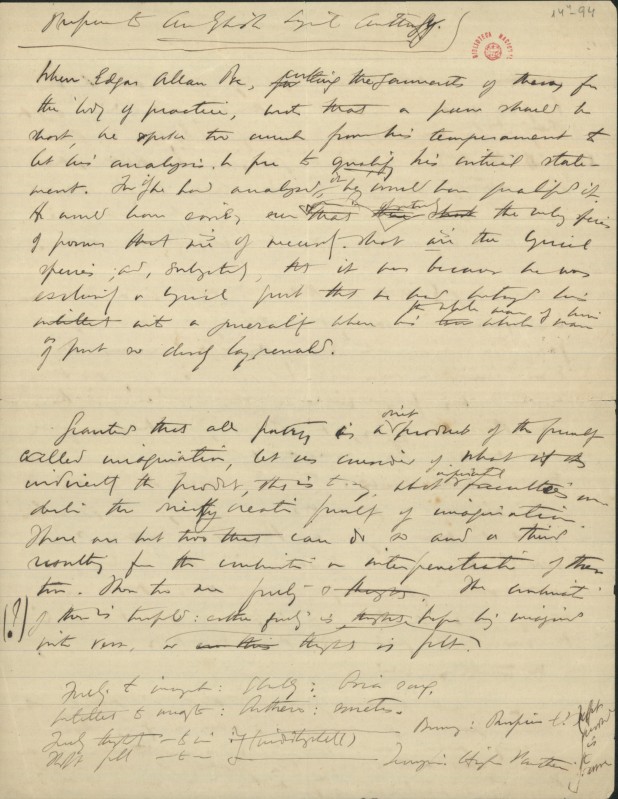Identificação
[BNP/E3, 144 – 94]
Preface to An English Lyrical Anthology.
When Edgar Allan Poe, cutting the garments of theses from the body of practice, wrote that a poem should be short, he spoke too much from his temperament to let his analysis be free to |qualify| his initial statement. For if he had analysed it, he would have qualified it. He would have easily seen that objectively the only species of poems that are of necessity short are[1] the lyrical species, and, subjectively, that it was because he was exclusively a lyrical poet that he had betrayed his intellect into a generality when his whole man of[2] part so closely lay †.
Granted that all poetry is a direct product of the faculty called imagination, let us consider of what it is indirectly the product, that is to say, what inspirational faculties underlie the directly creative faculty of imagination. There are but two that can do so and a third resulting from the combination or interpenetration of these two. These two are feeling and thought. |The combination (?) of this is threefold: either feeling is thought, or thought is felt before being imagined into verse.|
Feeling to imagination: Shelley: Asia song.
Intellect to imagination: Antero: sonnets.
Feeling thought___ to imagination: (|*indistinctly|) Brwoning: Prospice – (?) Effect produced is the same.
Thought felt___ to imagination: Tennyson: Higher Pantheism
[94v]
Antero does not, shortly speaking, feels what he thinks. He feels imaginatively what he thinks, what is a different thing. The man who, properly speaking, feels what he thinks he finds the thought merged in the feeling. In Antero, on the contrary, the thought remains clear in the imagination (as if symbolic) goal. The garments of imagination lie close to the body of thoughts and give essentially its shape.
Although to feel what one thinks is not, to a short analysis, the same as thinking what one feels, yet after passing through imagination into verse, the effect becomes the same. Besides the man who interprets is feeling his thoughts, as thinking his feelings, will in the first case, if he feels, think his feelings, in the second, if he then feels his thoughts. The connection between feeling and thought is the essential basis: thus Tennyson thinks his feelings in such a poem as {…}, and feels his thoughts in such a poem as “The Higher Pantheism”. The result is more or less the same, because the mental processes involved, though specifically diverse, are essentially manifestation of the same temperament – one in which the Universe of feeling into thought or thought into feeling is natural and vain.
The highest kind of poetry is that in which there is one proportion for imagination, when feeling or thought spontaneously passes into imagination and so makes their selves into verse. The process of conversion of thought into feeling or feeling into thought indicates as shown of the imagination faculty is assimilating the inspirational matter.
[BNP/E3, 144 – 94]
Prefácio a uma Antologia Lírica Inglesa.
Quando Edgar Allan Poe, cortando as vestimentas das teses do corpo da prática, escreveu que um poema deveria ser curto, ele falou demais com o seu temperamento para deixar a sua análise livre para |qualificar| a sua declaração inicial. Pois se ele a tivesse analisado, tê-la-ia qualificado. Ele teria facilmente visto que objectivamente as únicas espécies de poemas que são necessariamente curtas são as espécies líricas e, subjectivamente, que foi porque ele foi exclusivamente um poeta lírico que ele traiu o seu intelecto numa generalidade quando o homem no seu todo de parte permaneceu tão perto †.
Dado que toda a poesia é um produto directo da faculdade chamada imaginação, consideremos o que é indirectamente o produto, isto é, quais faculdades inspiradoras estão por trás da faculdade directamente criativa da imaginação. Existem apenas duas que o podem fazer e uma terceira resultante da combinação ou interpenetração das duas. Essas duas são o sentimento e o pensamento. |A combinação (?) disso é tripla: ou o sentimento é pensamento, ou o pensamento é sentido antes de ser imaginado em verso.|
Sensação para imaginação: Shelley: Asia song.
Intelecto para imaginação: Antero: sonetos.
Sentindo o pensamento___ para imaginação: (|*indistintamente|) Brwoning: Prospice - (?) O efeito produzido é o mesmo.
O pensamento sentido___ para imaginação: Tennyson: Higher Pantheism
[94v]
Antero, em suma, não sente o que pensa. Ele sente imaginativamente o que pensa, o que é uma coisa diferente. O homem que, falando propriamente, sente o que pensa, encontra o pensamento imerso no sentimento. Em Antero, pelo contrário, o pensamento fica claro na meta imaginária (como se fosse simbólica). As vestimentas da imaginação ficam próximas ao corpo dos pensamentos e dão essencialmente a sua forma.
Embora sentir o que se pensa não seja, para uma breve análise, o mesmo que pensar o que se sente, ainda assim, depois de passar da imaginação para o verso, o efeito torna-se o mesmo. Além de o homem que interpreta estar sentindo os seus pensamentos, assim como pensando os seus sentimentos, no primeiro caso, se ele sente, pensará os seus sentimentos, no segundo, se ele então sentir os seus pensamentos. A conexão entre sentimento e pensamento é a base essencial: assim, Tennyson pensa os seus sentimentos num poema como {…}, e sente os seus pensamentos em um poema como “The Higher Pantheism”. O resultado é mais ou menos o mesmo, porque os processos mentais envolvidos, embora especificamente diversos, são essencialmente manifestações do mesmo temperamento - aquele em que o Universo de sentimento em pensamento ou pensamento em sentimento é natural e vão.
O tipo mais elevado de poesia é aquele em que há uma proporção para a imaginação, quando o sentimento ou o pensamento passa espontaneamente para a imaginação e assim se transforma em verso. O processo de conversão do pensamento em sentimento ou sentimento em pensamento indica que a faculdade da imaginação está assimilando a matéria inspiradora.
[1] are /is\ of necessity short are /is\
[2] his whole man of /the whole man of him as\


